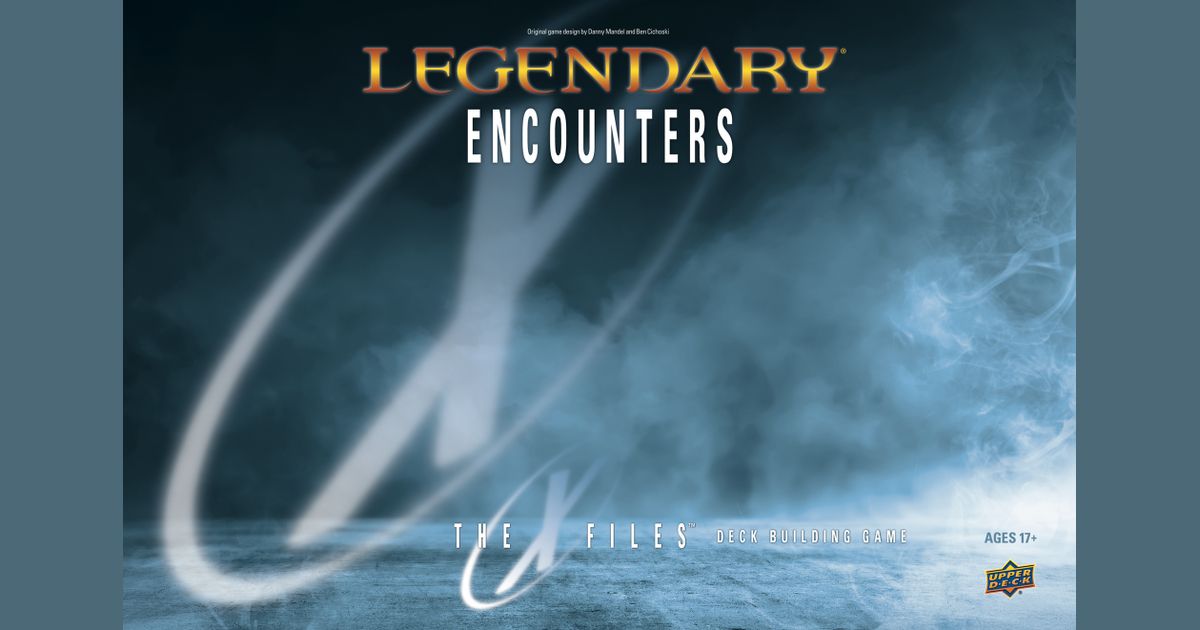From the Parallel Worlds Magazine archive.
Legendary Encounters: The X-Files Deck Building Game is one of a series of titles in the Legendary range of IP-licensed deck-building games. Previous Legendary titles have allowed players to take on scenarios from Firefly, Buffy, James Bond, Alien, Predator and others.
Like most deck-building games, each player begins with a weak hand of cards, offering either strikes or money. Money is mainly used to buy better character cards — in this game from an area called The Academy — while Strikes are generally used to first scan/reveal and then defeat event cards. These cards march through a track, known in this version as The Shadows, gradually becoming cheaper the closer they get to being automatically revealed in The Field. Enemy cards in The Field will cause damage to players if they remain at the end of a player’s turn.
One of the strengths of this game series is the genuine respect and passion clearly shown to the source material, ensuring that card effects represent events and characters faithfully. For example, a card representing Scully’s medical training may allow you to heal damage, Walter Skinner provides options to direct other players to draw cards, while The Lone Gunmen have abilities which reveal hidden events.
This edition features some unique rules and mechanisms which reflect the murky world and transactions of paranormal investigation and conspiracy. The most obvious additions are the Belief and Doubt cards, which are added to your deck at various times and each character has a unique ability which activates when these cards are drawn. Fox Mulder, for instance, has a Belief power which allows all players to discard a Doubt, while his own Doubt triggers his deep paranoia and prevents all players from using coordination abilities until his next turn.
Next, there are three pieces of evidence in each game which the players need to collect. Hidden in the event deck are three Lead cards. Once revealed, these provide a goal that must be completed to first reveal and then remove one of three Evidence cards. Uncollected Evidence provides the final showdown with extra abilities and will make your victory less likely. Not only that, but if Leads are discarded before you use them, you gain Doubt and irrevocably lose the chance to claim one of the pieces of Evidence.
Also hidden in the event deck are Informants. These are characters from the series who provide help to the protagonists — whether intentionally or not — and while they are revealed, they provide additional buffs to players for as long as they are kept alive.
You’ll need to manually sort 500 playing cards into different decks before you can play your first game.
Then, there are the Syndicate enemies, representing the conspiracy working against your efforts to investigate. These are similar to events, but they hide instead in the Academy deck. Once revealed, they block Academy recruiting spaces and have ongoing effects until they are defeated.
It’s an incredibly slick, enjoyable and versatile game, with generous replayability in the way the Event Deck and Academy can be constructed. There’s enough randomisation of enemies, End Games, Leads, Informants and Syndicate cards to ensure that each game is unpredictable and the flow of the game is incredibly smooth.
Production-wise, it looks and feels great. The card art uses screen captures from the series — rather than the cartoon original art used in some of the Legendary games — and this approach can be hit and miss, particularly with fans. But my personal feeling is that the screen caps in The X-Files fit well with the theme and each moment chosen reflects that callback to the show perfectly.
If you’ve never played a game in this series before, this also comes with my personal favourite component: a fully-printed neoprene play mat as the shared board, rather than a solid card surface. If you’ve ever played on a neoprene mat, you’ll already know how much joy and ease they add to playing card-based games, and the ones included with Legendary Encounters are great quality.
It’s not all good news. The Legendary system continues to come with the contents almost entirely un-organised. I have to say that The X-Files was a little better than my previous experience; but be warned, you’ll still need to manually sort 500 playing cards into different decks and organise them with dividers (provided blank) before you can play your first game. And this isn’t to be understated, because The X-Files took me about two hours to sort out — and this wasn’t my first time.
The overall structure of a game feels less like a narrative and more like a ‘clip show’ of your favourite moments.
So, this is a great entry in the series and probably a must for fans of the series — but how does it compare to the other Legendary games? The gameplay demonstrates a real maturity in the system, and the variety provided by so many different characters and combos makes this one of the best. However, if you’re looking for narrative ‘feel’ in a game, this isn’t the strongest. The Legendary game I’ve played most is Predator. Predator has some randomised elements, but generally you play through three acts which mirror the structure of the movie and every game guarantees a showdown with the creature itself, as well as the option of a “get to the chopper” moment. This is, however, at the cost of no surprises in the contents of each event deck.
It’s an incredibly slick, enjoyable and versatile game.
By contrast, The X-Files provides a huge amount of variety, with each season deck only using about half of the cards available for each game. Entire episodes are often represented by a single card. What this means is that while there is great fan service in the content, the overall structure of a game feels less like a narrative and more like a ‘clip show’ of your favourite moments.
That may not matter to you. I find it a shame, but the gameplay itself makes this a strong-enough title that it’s not a deal-breaker. The upshot is a game session which feels like winning or losing, rather than experiencing a narrative. For me it’s enough to have a wonderfully themed and challenging deck-builder in which the cards behave mechanically just as you would expect the characters to act. It’s a little like conducting your own investigation into the contents of each mysterious deck, and as a long-time fan of Mulder and Scully, that’s almost everything I wanted this game to bring.



